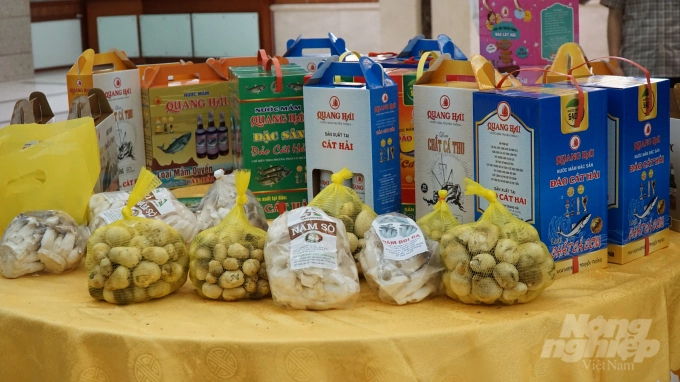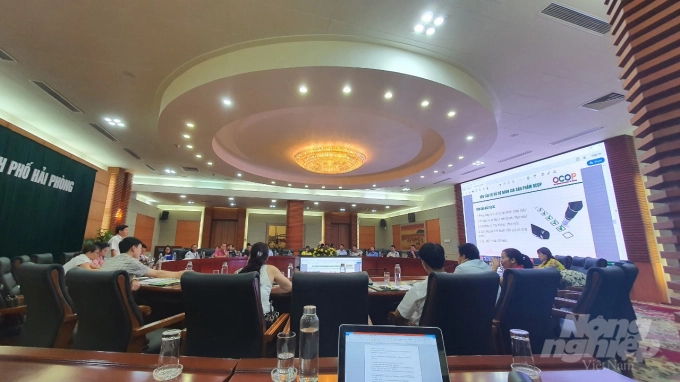December 13, 2025 | 21:01 GMT +7
December 13, 2025 | 21:01 GMT +7
Hotline: 0913.378.918
December 13, 2025 | 21:01 GMT +7
Hotline: 0913.378.918

OCCP products on display in northern city of Hai Phong. Photo: Dinh Muoi.
The implementation of One Commune, One Product (OCOP) programme in the northern city of Hai Phong has received much interest from local residents and contributed to enhance the value of agricultural products. However, the number of products engaged in the programme are still modest and not meet the city’s potential.
Last year, there were 12 products of eight organisations and individuals taook part in the programme. Of these, 1 products has been rated with four stars while 11 ones rated with three stars.
A total of 32 products registered for the programme this year.

A meeting relating to the OCOP programme held between enterprises, cooperatives, production units with local authority in Hai Phong City in July. Photo: Dinh Muoi.
Tang Xuan Tho, director of Hai Phong City’s Sub-department of Rural Development, said the number of OCOP branded products were too small compared with the city’s potential.
He said due attention hasn’t been paid to the management of the programme which result in the fact that it was behind the schedule.
The difficulty in preparing evaluation documents, product classification, lack of supporting documents as well as challenge in allocating reciprocal capital was also a problem.
The city has dozen of specialties which could take part in the programme including Dat Cang liquor, mackerel fish sauce and moon cake, he said.
Tho said local authority was conducted a survey on the issue with the hope that more products would be involved in the programme in the future.
The city authorities have promulgated a number of plans and documents providing guidance and directions on implementing the OCOP programme.
Resolution No 13 of Hai Phong City People's Committee which was issued in 2017 has set forth six policies to support the development of agriculture, fisheries, rural economy and increase farmers’ income. It is considered as the key to the agricultural development of the port city.
Accordingly, organisations and individuals who produced typical products or the ones that have strong competitive advantages of the locality would received assistance to renovate technology, equipment, label and promote product consumption. The level of support is equal to 50 per cent of the cost but it must not exceed VND1 billion (US$43,150).
Last year, the city has provided VND4.39 billion (US$189,310) in aid to upgrade 12 products under OCOP programme and VND2 billion (US$86,340) was expected to be spent on 10 products this year.
It can’t denied that the programme will leverage the city’s advantages in natural resources, culture, and rural labour.
In addition to boost the creation of high-quality products, generating jobs and increasing incomes for local residents and bring the locality closer to sustainable development plans.
“Thanks to the support of the programme, I secure VND700 million (US$30,200) for purchasement of machinery and other things last year”, said Pham Van Quyen, owner of a OCOP product in Tien Lang District.
He said he hoped to receive more assistance, adding that the city’s agricultural products was facing fierce competition from Chinese ones as well as those from other provinces.
Nguyen Thi Ha, owner of a rice product under OCOP brand, said she expected that administrative procedures would be simplified to facilitate people’s participation.
“Hai Phong has many products not only cultivation but also seafood ones. Therefore, it is necessary to fully exploit the strength of these products to expand the consumption to oversea market”, she said.
The OCOP programme was launched in May, 2018 to develop one strong product for each commune. It has contributed to rural area construction, according to the Ministry of Agriculture and Rural Development.
As of May, 61 out of 63 cities and provinces nationwide have built their OCOP frame programme at the provincial level, 32 of which have already completed the programme design.
As many as 1,711 OCOP products have so far been certified, meeting 71.3 per cent of the set target.
Author: Dinh Muoi. Translated by Thanh Lam. Edited by Duc Huy.

(VAN) With high automation, large capacity, and a green development orientation, the Hai Duong Plant Branch is becoming an important anchor for the animal feed market.
/2025/12/01/2936-2-222331_70.jpg)
(VAN) Mortgaging his house and giving up a pharmaceutical management career, Mr. Nguyen Quang Duy succeeded in bringing Khanh Hoa's sea grapes to demanding markets such as Japan and the U.S.

(VAN) The large-scale agroforestry investment project aims to develop a leading sustainable agro-industrial center in Angola.
/2025/11/28/3433-1-212821_213.jpg)
(VAN) Many localities across the coconut land of Vinh Long are replicating emission-reducing models in production and daily life, contributing to the targets for emission reduction and green economic development.

(VAN) The green transition is an inevitable path for collective economy to achieve balanced growth and align with global trends.

(VAN) The TH Group is not only Vietnam’s leading clean-milk producer; it is also leaving a strong mark on sustainable development as it pursues the goal of carbon neutrality.
/2025/11/27/3830-1-152901_403.jpg)
(VAN) Dong Nai is developing its key crop areas, expanding planting area codes, and applying high technology to increase the value of agricultural products, aiming at a green and sustainable agriculture.